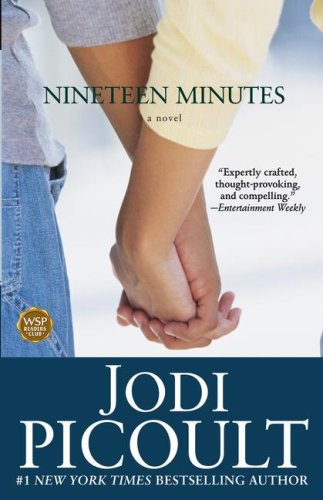 Synopsis:
Synopsis:
In nineteen minutes, you can mow the front lawn, color your hair, watch a third of a hockey game. In nineteen minutes, you can bake scones or get a tooth filled by a dentist; you can fold laundry for a family of four. . . .
In nineteen minutes, you can stop the world, or you can just jump off it.
In nineteen minutes, you can get revenge.
In an emotionally charged novel, bestselling author Jodi Picoult delves beneath the surface of a small town to explore what it means to be different in our society.
In Sterling, New Hampshire, 17-year-old high school student Peter Houghton has endured years of verbal and physical abuse at the hands of classmates. His best friend, Josie Cormier, succumbed to peer pressure and now hangs out with the popular crowd that often instigates the harassment. One final incident of bullying sends Peter over the edge and leads him to commit an act of violence that forever changes the lives of Sterling’s residents.
Even those who were not inside the school that morning find their lives in an upheaval, including Alex Cormier. The superior court judge assigned to the Houghton case, Alex—whose daughter, Josie, witnessed the events that unfolded—must decide whether or not to step down. She’s torn between presiding over the biggest case of her career and knowing that doing so will cause an even wider chasm in her relationship with her emotionally fragile daughter. Josie, meanwhile, claims she can’t remember what happened in the last fatal minutes of Peter’s rampage. Or can she? And Peter’s parents, Lacy and Lewis Houghton, ceaselessly examine the past to see what they might have said or done to compel their son to such extremes. Nineteen Minutes also features the return of two of Jodi Picoult’s characters—defense attorney Jordan McAfee from The Pact and Salem Falls, and Patrick DuCharme, the intrepid detective introduced in Perfect Match.
Rich with psychological and social insight, Nineteen Minutes is a riveting, poignant, and thought-provoking novel that has at its center a haunting question. Do we ever really know someone?
Review:

Schoolyard violence erupted here in San Joaquin County. It was January 17, 1989, and I was en route to my parent’s house with my oldest son who was then 22 months old. I could not believe what I was hearing on the radio as I drove. That afternoon, I sat in front of the television with my parents, stunned and disbelieving reports of Patrick Purdy storming the playground at Cleveland School — where he had been a student — in nearby Stockton. Purdy murdered five Cambodian and Vietnamese immigrant children, and wounded 29 others, as well as one teacher, before turning the gun on himself. (I did not know any of those children or their families, but I have been to their graves many times — they are in the cemetery where my mother-in-law and father-in-law are buried.) It was a seminal moment — the first time, as a new parent, it ever occurred to me that, in addition to worrying about my child getting safely to and from school, I would have something else to worry about: Whether he would be safe at school.
Twenty-one years later, Phoebe Prince, age 15, was bullied and humiliated to the point that she told a close friend school had become “intolerable.” Phoebe hanged herself in order to escape being called a “stupid slut” and “whore,” cornered and attacked in the school bathroom, threatened via text messages, and taunted by girls who were jealous of the fact that she had dated two of the boys on whom they had adolescent crushes. The day before she took her own life, they yelled at her, “Why don’t you go kill yourself?” On January 15, 2010, she did. Nine students now face criminal charges — their lives forever changed as surely as Phoebe’s was and Phoebe’s family’s is. In the aftermath, the topic of schoolyard bullying and the tragedies to which it can lead, are again the focus of discussion and debate.
Since the day bullets rang out in Stockton until today, have we learned anything about what makes kids into bullies, how to stop them from turning into schoolhouse monsters, or how to protect the children they prey upon? While conducting research for Nineteen Minutes, Picoult says that “[t]wo . . . facts . . . surprised me: for many of these shooters, there is the thinnest line between suicide and homicide. They go to the school planning to kill themselves and decide at the last minute to shoot others too. And that, psychologically, a single act of childhood bullying is as scarring emotionally as a single act of sexual abuse.”
Through a combination of flashbacks and present-tense narratives, Picoult tells the story of two families: One comprised of a highly successful, professional, single woman and the daughter she refused to abort. Alex Cormier raised Josie on her own when her married lover abandoned them. The other is an intact family of four. Both families suffer in ways none of them could have ever imagined. Picoult cleverly takes the reader just to the point in the present-day story where she wants his/her attention focused before yanking the action back to a few months or even years prior. It is a highly effective way of keeping the reader interested, while divulging important character or plot details at the precise point in the reader’s experience, pace, and with the impact Picoult designed.
Picoult aptly describes the book as the tale of “an archetypical moral dilemma: Do you act like yourself, and risk becoming an outcast? Or do you pretend to be someone you’re not, and hope no one finds out you’re faking?” How to fit in and get along within a peer group is a quandary that comes into full bloom during adolescence, of course. But it is a quagmire that never really ends as we move through college, young adulthood, and into middle age, navigating workplaces, social organizations, and our communities.
Picoult skillfully evokes empathy with every main character, including Peter. We all know how it feels to be out of the “in” crowd, so Picoult’s descriptions of the bullying and harassment to which Peter is subjected are chilling and heart-breaking. The reader can, to a point, put him/herself in Peter’s place — or his parents’. Surprisingly, I did not become as emotionally attached to Alex as I thought I would. That is because the character was initially quite self-absorbed, to her daughter’s detriment. Moreover, as an attorney, I was annoyed by the character’s foolish determination to be the judge who would eventually preside over Peter’s criminal trial, even though her daughter was one of the students most impacted by his actions. I lost respect for Alex, which was probably not a result unintended by Picoult, although by the end of the book I felt some renewed compassion for her.
Rather, the character with whom I found myself most identifying and emoting was Lacy, Peter’s mother. “Through the driving downpour, with her hair and clothes plastered to her, she took stock of the graveyard and saw the faces of the children who would still be alive, if her own son had never been born. Lacy put her hand over her abdomen. The pain cut her in half, like a magician’s trick, except she knew she would never really be put back together.”
All parents experience boundless hope about their young child’s future, and ultimately suffer some disappointment when the child misbehaves, does not excel at a particular task in the way the parent had hoped, or exhibits a character trait the parent abhors. Few, however, will ever experience the type of disheartening, tormenting defeat that befell Peter’s parents. Through them, Picoult poses two questions that many parents, on some level, will have to address at some point: “Do you stop loving your son just because he’s done something horrible? And if you don’t, do you start hating yourself?” I was mesmerized by the parents’ reactions as events unfolded, wondering how each would cope and whether their relationship could possibly withstand the strain. They were, in fact, the only two characters whose fate I found myself wondering about long after I read the last page of the book. Lacy reminded me of a woman here in Lodi whose son was found guilty of murdering his wife and sentenced to life in prison. For many years after that, I saw her at church on a regular basis. While I never saw her husband accompany her, she was obviously getting on with her life, continuing to serve her congregation. I used to watch her standing in the back of the sanctuary, greeting other parishioners and handing them bulletins, wondering how she managed to pull herself out of bed each morning and even keep living her life at the most basic level. Through the character of Lacy, Picoult givers readers a sense of the depth of anguish felt by the parent of a child who could commit such a heinous act and, in so doing, makes Lacy the most fully developed, compelling, complex character in the book.
Some plot points are completely predictable and, to be fair, the book would not be a believable read were they not. To compensate, Picoult has thrown in a couple of unexpected twists, along with creating characters who could be your next door neighbor, including Peter. Picoult’s research led her to the conclusion that “kids who resort to violence are not all that different from the one living upstairs in your own house, most likely – as scary as that is to imagine.” Thus, this story does not boast a classic protagonist and antagonist, and raises numerous difficult questions, ultimately providing few, if any, answers. Therein lies its strength. As one reviewer put it, in Nineteen Minuts, Picoult succeeds in her mission “to keep readers on the treacherous edge of making their own minds up.”








9 Comments
interesting, thanks for sharing the review.
Hopefully you’re able to recover from your medical problems and cataract surgery so you can continue to read as much as you like to. It used to be one thing I took for granted and now am coming to realize it’s a blessing.
Excellent review. I found myself drawn into your writing as you seem to be with Jodi’s.
Again, excellent!
-CYM
Really enjoyed the review…I added the book to my reading list!
.-= Melissa Henderson´s last blog . . . Book Review Wednesdays at Cym Lowell =-.
Pingback: Ms. Smarty Pants Know It All » Book Review Blog Carnival No. 42
Thanks for adding your write up to the Book Review Blog Carnival!
.-= Ms. Smartypants´s last blog . . . Book Review Blog Carnival No. 42 =-.
Pingback: Saturday Review of Books: April 10, 2010 | Semicolon
Pingback: The Mad Editor’s Round-Up #17 | Diary of a Mad Editor
Pingback: Dodgeblogium » BoMS curt edition